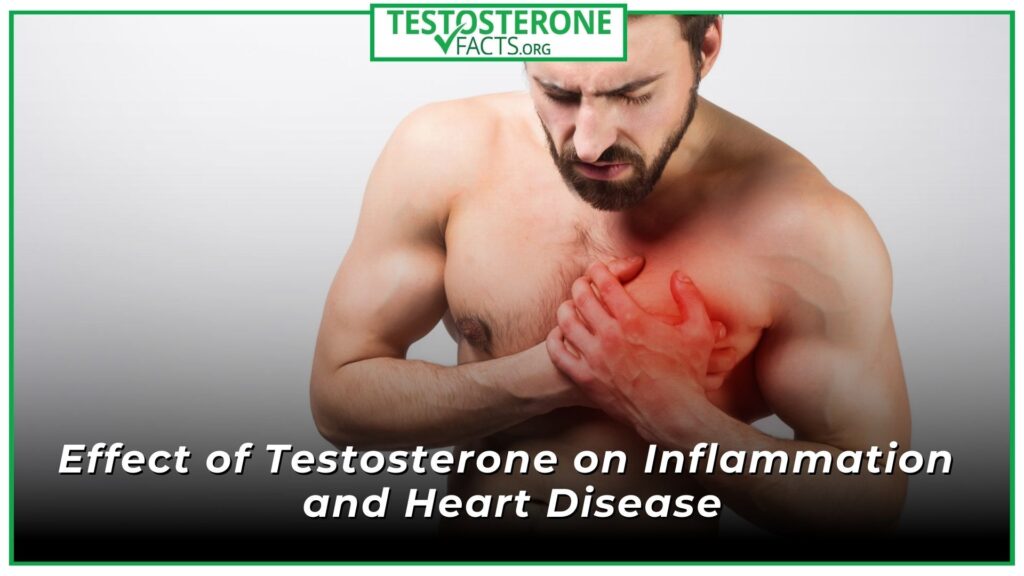
Effect of Testosterone on Inflammation and Heart Disease
- TFacts Staff

Ever wondered how testosterone, inflammation, and heart disease are related? That is an interesting issue that many scientists have recently researched. In this guide we’ll go deeper into this seemingly complex issue and see what science has to say.
Table of Contents
ToggleWhat Is Testosterone?
Testosterone is quite an important hormone for men; indeed, it plays a key role in determining the health status of men, particularly in aspects like bone strength, muscle size, as well as influencing mood and energy.
Testosterone levels naturally decline as a man ages. This drop, often referred to as “low T,” can start as early as age 30 and continue throughout life. Some men hardly notice it, while others can experience effects like lowered libido, fatigue, and shifts in mood.
The Inflammatory Process and Its Implications
Inflammation is an important part of how the body reacts to injurious stimuli, such as infections or injured cells, but it can also be involved in many ways in health problems, such as heart disease with chronic inflammation.
Other studies have found that testosterone levels may correlate with inflammation in the body. A study proved that men with lower levels of testosterone also had higher levels of inflammatory markers in their blood. This leads some to interpret this connection as being reversed – higher testosterone levels suggest lesser overall inflammation.
Cardiovascular Health: The Broader Context
Heart disease remains a great health menace, especially in the United States. It is the number one cause of death among men in America, hence accounting for about 25% of all male deaths, according to the Centers for Disease Control and Prevention.
Scientists are beginning to give a lot of attention to the potential role of testosterone in heart health. Some evidence suggests that lower levels of testosterone are associated with increased risk for heart disease. For example, studies found that males who had lower levels of testosterone were also much more likely to have coronary artery disease.
Testosterone Replacement Therapy: Benefits and Risks
Such a potential relationship between low testosterone and heart problems has resulted in the investigation of TRT. In fact, some studies on TRT have shown considerable success in such therapy. For example, a European Heart Journal study demonstrated the effectiveness of testosterone therapy in patients diagnosed with heart failure. The latter went through improved exercise ability as a result of testosterone therapy.
A few studies, however, presented concerns regarding possible negative consequences of TRT. For instance, one study that appeared in NIH reportedly revealed that testosterone therapy could pose a risk for developing some heart conditions in particular men.
Due to these mixed findings, doctors are not still in agreement with the widespread use of TRT for heart health. More large, long-term studies must be done in order to establish the safety and efficacy of this treatment.
Practical Implications and Recommendations
Considering the present stage of research, the following proposals can be considered:
Medical Evaluation
Such people who have an anxiety of their testosterone levels should take consultation from a healthcare provider and get evaluated.
Cardiovascular Risk Management
This is the very high and crucial importance of following set rules for heart health. It includes the necessity of a balanced diet, regular exercise, not smoking tobacco, and proper management of all other known risk factors.
Stress Management
Chronic stress may also influence testosterone levels and heart health. Effective methods might help to curb such stress.
Continued Education
Good to be abreast of new research in the area, but only from reliable scientific sources for proper information.
Conclusion
This is a dynamically changing area of medical research concerning a complex interaction between testosterone, inflammation, and heart health. Despite numerous lines of evidence that might interconnect these factors, definite causality or treatment methods remain elusive.
As science continues to unravel even more answers, people should not forget to pay close attention to heart health via proven prevention strategies. Speaking with healthcare professionals remains an integral component of personal risk assessment and management plans.
For more in-depth information regarding testosterone and the ways in which it impacts health, please visit Testosterone Facts.
Frequently Asked Questions
1. Is there a direct causal relationship between low testosterone and cardiovascular disease?
Some studies have shown that low levels of testosterone are associated with an increased risk of heart problems; however, it is not clear if one causes the other. Testosterone’s relationship to heart health is complex and likely involves multiple factors.
2. Does testosterone replacement therapy definitively improve cardiovascular outcomes?
There are few studies with respect to the effect on heart health of testosterone replacement therapy. Many studies suggest possible benefits while others suggest potential risks. So, that decision to begin testosterone therapy should be left to each individual following consultation with a healthcare provider.
3. Are there evidence-based methods to naturally increase testosterone levels?
Getting enough sleep, having a healthy body weight, exercising regularly, and controlling stress may help many men build testosterone levels, but the effectiveness of these approaches will vary widely from man to man, and the increases in some may be insufficient to achieve normal physiology for men diagnosed with hypogonadism.
4. How does chronic inflammation impact cardiovascular health?
Chronic inflammation has been associated with the pathogenesis and progression of atherosclerosis, which refers to plaque accumulation within arterial walls. The risk of overall heart conditions, which include heart attacks and strokes, may thus increase.




